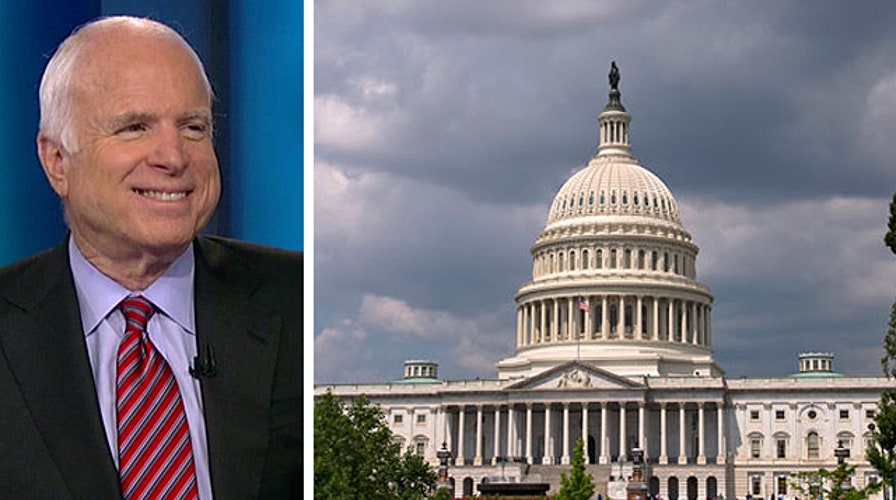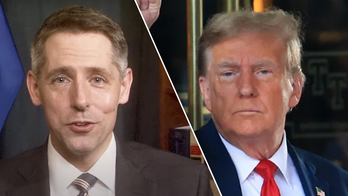McCain: Trying to defund ObamaCare was 'fool's errand,' deceptive of American people
Sen. John McCain on the Senate budget deal to end the partial suspension of government services, the partisan politics that cripple Washington and his criticism of Sen. Ted Cruz's strategy
Another last-minute deal struck, another crisis postponed in Washington.
But lawmakers have little time to bask in the temporary relief the bill provides. As furloughed federal employees return to work Thursday, Congress faces another budget deadline three months from now, and a deadline to raise the debt ceiling a few weeks after that.
After the chaos caused by the impasse of the last 16 days, officials are hoping this time to do more than simply meet those deadlines with another pair of stopgap measures.
"We believe there is common ground," Senate Budget Committee Chairwoman Patty Murray, D-Wash., said Thursday.
Congress and the Obama administration thus far have given the American people little reason to believe they'll reach that middle ground and seriously address the country's fiscal problems. But with the bipartisan frustration over the latest showdown boiling over, lawmakers on both sides are vowing to try harder.
Obama, in remarks from the White House on Thursday, said "there are no winners" out of the budget impasse. He said the "spectacle" hurt the U.S. economy and credibility.
"The good news is, we'll bounce back from this," Obama said.
Once again, a small group of lawmakers has been appointed to craft a broader budget deal -- facing a mid-December deadline with the shadow of the failed "super committee" haunting their endeavor.
Meeting for breakfast Thursday morning, top budget writers were cautiously optimistic.
House Budget Committee Chairman Paul Ryan, R-Wis., said the group's goal was "to get this debt under control, to do smart deficit reduction, and to do things that we think will grow the economy and get people back to work."
"Talking doesn't guarantee success," said Rep. Chris Van Hollen of Maryland, senior Democrat on the House Budget Committee.
The group met after Obama signed a short-term deal to fund the government through Jan. 15 and raise the debt ceiling through Feb. 7.
On top of the pressure to craft a bigger, better budget deal, Obama is also leaning on lawmakers to take up other sidelined projects -- like a massive farm bill, and a comprehensive immigration overhaul which earlier this year passed the Senate.
"We still need to pass a law to fix our broken immigration system. We still need to pass a farm bill. And with the shutdown behind us and budget committees forming, we now have an opportunity to focus on a sensible budget that is responsible, that is fair, and that helps hardworking people all across this country," Obama said Wednesday night.
Whether the air in Washington is now too toxic for these issues to be tackled remains to be seen. Republicans blasted Obama over the past few weeks for saying he would not negotiate over the debt ceiling and budget measure. In the end, Obama mostly got what he wanted.
Rep. Charles Boustany, R-La., told Fox News that going forward, Obama's got to be more engaged in negotiations. And if he's not, "we're not going to get anything done here."
Republicans, who launched the showdown over concerns with ObamaCare, still have serious concerns about the law and are expected to continue to raise them in the coming negotiations.
One recurring theme has been the law's medical device tax, which critics say is a punitive measure that will cripple the industry in the United States. A plan to scrap or delay the tax as part of the latest budget bill was tabled, but could resurface in talks over the next few weeks.
Sen. Marco Rubio, R-Fla., who opposed the budget deal, vowed to fight against ObamaCare and for a better fiscal plan.
"We have a national debt that now is going to be over $17 trillion, and there is not a single plan in place to address it. We have a disastrous health care law that's going to be hurting real people in dramatic ways," he told Fox News. "We have missed a golden opportunity to do something about it, but we haven't given up the fight."
The Associated Press contributed to this report.





